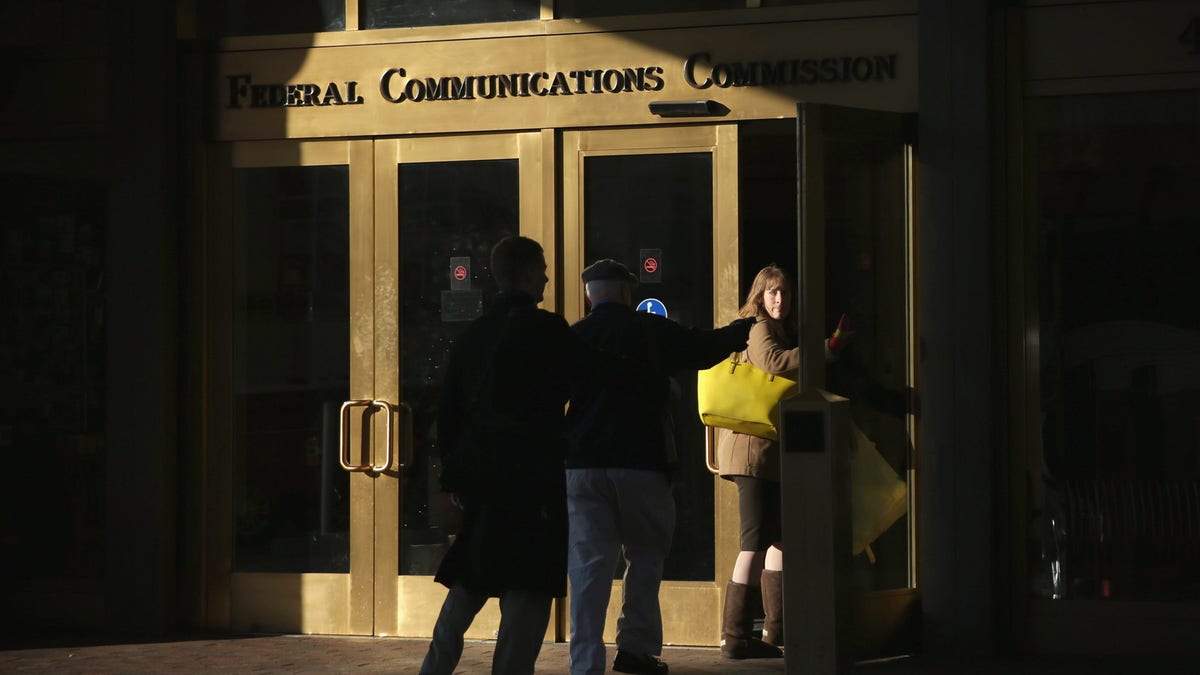
WASHINGTON, DC - DECEMBER 11: People enter the Federal Communications Commission building December 11, 2014 in Washington, DC. The commission held its monthly meeting as activists held a rally outside to call for net neutrality. (Photo by Alex Wong/Getty Images) (2014 Getty Images)
You might have missed it (it’s okay, you’re normal), but a couple of weeks ago a group of experts were called to the U.S. Capitol to provide their thoughts on how best to protect our Internet, without stifling economic opportunity, and just today the Federal Communications Commission (FCC) officially announced its proposal to do so. The implications for the various proposals are nothing small, and will impact every business - and every person - in this country and beyond.
“Net neutrality” has been the talk of the tech world over the last year or so as the FCC has been kicking around the idea of increasing regulations in order to protect a free and open Internet. Although the idea of “protecting” the Internet sounds good, how exactly that is accomplished is what most outside (and too many inside) of DC’s famous Beltway don’t understand. The debate stems from two potential problems: 1) New FCC regulations may mean an increased cost for our nation’s businesses and consumers, as well as 2) The possibility of an unequal, negative impact on lower income and minority Americans.
Although well-intentioned, the FCC is composed of a partisan group of appointed officials, who may be more politically motivated than concerned for the nation’s future welfare.
Although the FCC today announced its intent to enact what policy wonks call a “Title II reclassification,” a Congressional bill was released in January in anticipation of this proposal. During the Capitol Hill debate on the draft legislation, numerous experts offered their own opinions on the best way to safeguard the Internet. Michael Powell, son of former Secretary of State Colin Powell and former Chairman at the FCC, testified on behalf of an organization that represents the cable industry and (not surprisingly) is not in support of the FCC’s proposal, which will increase the regulatory burden upon Internet Service Providers (ISPs). ISPs have long argued that increased costs from such regulation will shift resources that might otherwise have been invested in expansion, better products, and cheaper prices.
Despite coming from potentially biased sources, the arguments are still valid. If companies, large and small, are forced to comply with the FCC’s proposal, increased business costs will mean that large companies may have to choose to relax investment, hire less, and raise consumer costs. Economists and financial analysts will argue that businesses rarely allow additional expenses to impact the bottom line; costs will be cut elsewhere to maintain income, or prices to customers will have to increase. If you owned one of the thousands of small ISPs around the country who stand to be impacted by these new FCC regulations, you would do the same. If you were a shareholder in one of the major corporations that will feel the financial squeeze of new regulations, you would demand it.
Other experts have made the argument that there can also be a disproportionate impact on poor and minority communities from proposed regulations. If companies are threatened with higher costs from overly burdensome FCC rules, they will make cuts within an industry that has hired more than one million minorities. Larger companies with histories of investing in diverse hiring and training programs, as well as programs to invest in broadband service expansion in poorer communities, may have to eliminate or reduce these investments in order to please shareholders. Diversity may have been proven to expand a company’s bottom line, and providing a benefit to low-income communities is good PR, but when cuts have to be made to maintain profits these programs will be on the chopping block.
- Pizza With A Side Of Profanity: Hispanic Marketing Hits A New Low
- Opinion: Now Is Not The Time To Play Games With Spectrum
- Opinion: Battle over Internet regulations is the civil rights struggle of the 21st century
- No Stranger To Controversy, Texas Pizza Chain Takes Heat Over Spicy Name
- Opinion: Unlocking The Power Of Broadband Throughout Our New America
- California ‘Kill Switch’ Bill Would Disable Stolen Smartphones
- Opinion: Making broadband work for all Latinas
- Best sports pix of the week
- Best pix of the week
When considering the many alternatives, there are a number of ways to protect the Internet. Proponents see the FCC’s vision as necessary, despite the potential economic damage. They want as much oversight as necessary to ensure that the Internet meets their standards. But, there has to be a balance between protecting freedom, access, and equality and maintaining growth in one of the few booming industries in our economy. Appointing ten million government bureaucrats to oversee every Internet transaction might guarantee that no business is discriminated against online, but would be incredibly costly to taxpayers and would bring Internet activity to a standstill. Although extreme, this example should serve to demonstrate that we don’t need protection from one problem, if it’s going to create others. We want smart protection that also protects our interests and our economy.
Needless to say, Americans deserve a bill that was crafted by its representatives, and debated by both Democrats and Republicans that were elected to represent citizens’ interests. Although well-intentioned, the FCC is composed of a partisan group of appointed officials, who may be more politically motivated than concerned for the nation’s future welfare.
For this reason, the draft legislation proposed in Congress is not just a start, but a good start we should support. Besides offering the protection Internet users and online businesses desire, it ensures that the economic costs don’t outweigh the benefits, that low-income and minority communities are not disproportionately impacted, and that our economy can continue on the path to an eventual recovery that benefits us all.








































